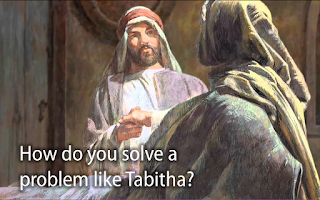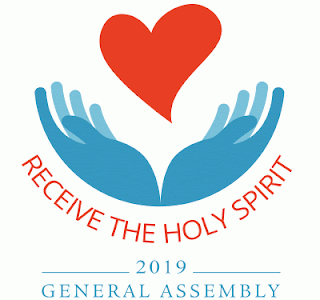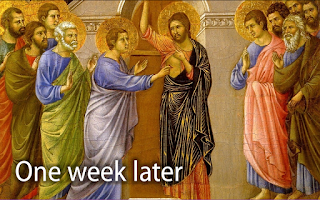Hespeler, 19 May, 2019 © Scott McAndless
Acts 11:1-18, Psalm 148, Revelation 21:1-6, John 13:31-35
| I |
n our reading this morning from the Book of Acts, Simon Peter is in hot water. He is being criticized and called to heel before all of the leaders of the church in Jerusalem. This is a case of discipline and there are lots of people complaining about him. I wouldn’t want to be in his sandals.
And what has he done – what could be so terrible that it would bring down the collective wrath of the entire church upon Peter’s head? Well, it was something that was so unspeakable that I do not know if it I should dare to say it, but here goes. Peter… Peter… went to the home of some people and had supper with them. I mean, can you imagine! But it was a real scandal. And it was a scandal because of who those people were. They were uncircumcised, that is to say, they were not Jews. You see, in our reading this morning, the Christian church is on the cusp of one of the greatest changes it will ever face in its entire existence.
The Christian church had from its very origins, from the time of Jesus and his first disciples, been an entirely Jewish affair. Every single Christian had been a Jew and they all easily assumed that it would always be so. What’s more, they all assumed that the Christian Church would always maintain the same kind of separation that was expected of all Jews. That meant that they could not associate with Gentiles and above all that meant that they could not eat with them. Simon Peter had broken a cardinal rule for being a Christian at that point in time.
It is hard for us to even appreciate the change that Peter is introducing to the church at this moment. He is pushing boundaries that nobody wanted pushed and introducing change so profound that, within a matter of decades, the church will be so transformed that few of the people in it at this point in time will even recognize it. The church will very quickly become totally dominated by Gentiles both in its membership and in its culture and this moment, when Simon Peter is being lambasted by everybody, is the key moment at the beginning of that change. It all starts here.
I find this rather fascinating because, of course, this may be the first time, but it is hardly the last time that the Christian church will have to deal with such radical change. And, what’s more, we are given something very special in this reading this morning. Simon Peter, as he defends himself before this inquiry, gives his reasons. “Then Peter began to explain it to them,” it says. And how does he explain it? He explains it “step by step.”
Those words really jumped out at me when I read this passage from the Book of Acts. Change, you see, is something that we are often frightened of and the reason why we are frightened of it is that it seems so big. It’s like you get up one morning and look around and realize that absolutely everything is different. And, yes, that is how we often do experience significant change in our lives, but it is not actually how change usually occurs. Change occurs step by step and Peter is doing a great favour for the church by breaking down those steps. In fact, he may even be giving us a template for how healthy change actually works in the church.
So, let us take a look at the step by step that Peter gives to the church. In the first step, Peter starts out in a bit of discomfort. This isn’t actually included in the account that Peter gives in this passage but we know it from the previous chapter of the Book of Acts. It all started out with Peter feeling a bit peckish. He was hungry and was waiting for a meal to be prepared for quite a while. This is not a minor point. Real change always starts with a certain amount of discomfort. We usually get to a point where our traditions and our ways of doing things are not quite satisfying us or helping us like they once did. That is one big reason why I would say that the church is ripe for change these days – the level of discomfort with what we once never questioned is at an all-time high.
But the big question is what do you do with that discomfort. It is notable the Peter is in no mind whatsoever to just throw out the tradition and teaching that he has received. But his discomfort does seem to lead him to reflect on that tradition in a Holy Spirit inspired way. The discomfort takes him back to the tradition but also allows him to reflect on it a new point of view.
And so, we have the hunger and Spirit-driven vision of Peter. Three times Peter sees a great sheet lowered from heaven, a sheet filled with animals of all kinds and Peter is invited to kill and eat without discrimination. But the problem is that, all his life, he has been told that the very last thing that he can do is eat without discrimination. In fact, discrimination – not just concerning what kinds of animals you can eat but concerning just about everything – has been at the very centre of his faith and his identity as a Jew. So, the vision takes him back to the very source of that requirement to discriminate and forces him to see it from an angle that he may have never considered before. “What God has made clean, you must not call profane,” insists the heavenly voice not once but three times.
Peter is here being forced to openly question not just the traditions of his people but also the scriptures themselves. That idea may be very shocking to some. I often hear people say that because we honour the scriptures, we should never question them. But I would argue that such a position is not honouring scripture at all. If you are truly willing to respect the scriptures, you need to be willing to enter into a conversation with them, to ask how they apply to various situations and to question them when they don’t seem to make sense. A lot of Christians seem to want to use the Bible to end all conversations by giving a final answer. That is not what the Bible was intended to do. For a faithful believer, the Bible is supposed to be something that begins conversations, conversations that take us deeper into knowledge of Jesus Christ.
We see that exact thing happening in Peter’s vision. When he is challenged to “Get up… kill and eat,” he responds with the very clear teaching of scripture as he understood it at that time: “By no means, Lord; for nothing profane or unclean has ever entered my mouth.”That is supposed to be a conversation ender. “I can’t eat indiscriminately. The Bible says it; that settles it!” But the Holy Spirit makes it clear that that is not the end of the conversation but rather the beginning because of what we now understand about the God who has been revealed in Jesus Christ: “What God has made clean, you must not call profane.”
So this vision of Peter is really important in the development of this change that is brewing for the church, but it is still the beginning of the conversation. It is just one step in Peter’s step by step account, and he actually leaves the vision more confused than anything else. The next step comes when he actually meets some people – people that he has always been told that he has to discriminate against. The particular individuals are not named in our passage but if you read the previous chapter you discover that they are the people in the household of Cornelius, a Roman Centurion who live in Caesarea, the Roman Capital of Judea. Peter goes to them and they eagerly respond to the message of Jesus Christ.
This encounter with real, flesh and blood people is clearly a very important step in this significant change in the life of the church, but it is one that I think we often discount. In the church, we have traditionally been very good at studying and interpreting the scriptures and their original meanings. We have also been pretty good at reflecting on the revelation of God in the person of Jesus Christ and allowing that to challenge us to the see the scriptures in new ways. Where we often have trouble is in taking all of that and applying it to the lives of real people and their struggles. We fail to meet people where they are. We are often too quick to discriminate or judge people for what is going on in their lives or who they are. But Peter finds that it is only when he starts to apply his insights to the people in Cornelius’ household that it all makes sense. This too is the action of the Spirit.
What I’m saying is that we need to get beyond the simple doctrines and theologies that we are often so obsessed with. Our faith has to be a faith that is practical and goes beyond mere ideas. I realize that I’m saying this as much to myself as I am to anybody else. We preachers, after all, do have a tendency to try and keep it all in the headspace and deal only in ideas. But we dare not forget that the faith that we talk about and the faith that we show to the world has to speak to the real-life needs of people and meet them where they are. When we forget that, we miss a vital step in the long journey that the Holy Spirit is taking his church on.
There is one final step in the story that Peter tells the church about the change that God is bringing about. It is a final confirmation of the work of the Spirit in people’s lives. Peter says, “And as I began to speak, the Holy Spirit fell upon them just as it had upon us at the beginning.” While Peter was sharing the Gospel message with the household of Cornelius, something happened that made it quite plain that God’s Spirit was present and active in the gathered people. From what he says, it seems to have been the same kind of ecstasy that the very first Christians had experienced on Pentecost when they did things like speak in strange languages. But what exactly happened to the group of people who were gathered in Cornelius’ home is not actually what matters here. What matters is that there was something that clearly showed that the Spirit was at work in people’s lives.
This is indeed the final step in the kinds of transformation that God would like to bring about in our churches. It may start with a certain sense of discontent, when people are feeling a certain dissatisfaction with the answers they have always been given or with the ways that things have always been done. This dissatisfaction then leads us back into our scriptures and traditions, not to seek simple yes or no answers but to finally begin a real conversation with the scriptures about what they say and how we need to understand those things in the light of what Jesus Christ has revealed to us about God. Then we get practical in helping people apply those lessons to their lives and work.
But the final confirmation comes when we see the evidence of the work of the Spirit in people’s lives – when we see lives and relationships transformed, when we see people finding new meaning to their lives, new depths to their ability to love. These kinds of miracles do happen in people’s lives and when we see them, we must celebrate them and rejoice in this evidence that God is indeed in the process of doing something new among us.
So think about the change that God wants to bring about in the church. Do not fear it. God is not interested in turning our whole world upside down all at once. But if we are open to it, God will take us through the journey of necessary change step by step. This is something that God does because he loves us and expects great things from us. 






